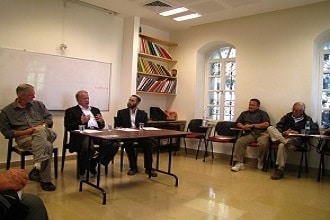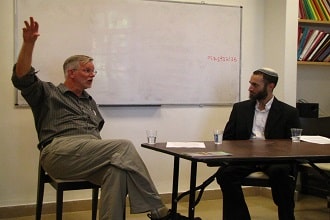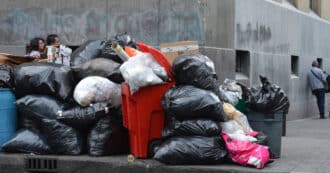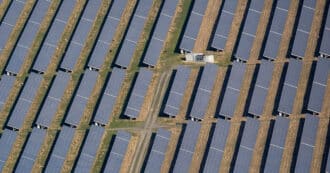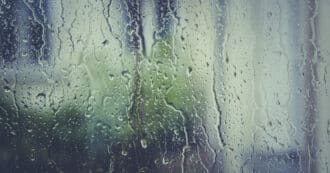By Rotem Weizman for The Interfaith Center for Sustainable Development
On October 8th, The Interfaith Center for Sustainable Development (ICSD) held a panel at the Jerusalem Intercultural Center of Christian, Jewish, and Muslim religious personalities speaking on coexistence and faith in the Holy Land. This was the second of three panel events that ICSD is organizing for groups from Travcoa/ Diesenhaus Unitours. ICSD held a similar panel in March, 2013, and will hold another in late October. The panel was comprised of Reverend Timothy Lowe, Dr. Ali Khamis, and Rabbi Yonatan Neril.
The Rev. Timothy Lowe is rector of the Tantur Ecumenical Institute in Jerusalem and an Orthodox priest. Father Timothy said that what Jerusalem needs most is a sophisticated vision. He said that “the division in Jerusalem is a fact of life and it is getting bigger. No one is taking a brave step”. In reply to a question Rev. Lowe explained what he feels turns faith into fundamentalism, “it is desperation and fear, it’s a solution to complicated problems, it stems from ignorance and prejudice. Financial instability, vulnerability and unemployment make people turn to the easiness of fundamentalism.” He added, “This makes education important. One has to hear the people from one’s own faith community protest against extremism. We must educate for spirituality and love for the other.” Dr. Ali Khamis is a lecturer at Al Quds University in Educational Science and speaks at his local mosque. Dr. Khamis talked about coexistence and said “Islam does not mean terror and fanaticism it means peace. I’m saddened that people have different ideas about Islam. Muhammad was a messenger of God so he always called for peace.” He also spoke of the unique situation in Jerusalem saying: “The majority wants peace, coexistence and free access to their religion. Also, the religious leaders I know feel this way.This will bring all three religions to live as brothers and as people of faith”. Rabbi Yonatan Neril, founder and executive director of The Interfaith Center for Sustainable Development talked about the unique way that people of different faiths can unite around an issue of shared concern, notably the environment. He noted how “in general in the Holy Land people tend not to have deep, meaningful interactions with people from other faiths. Many participants in our seminars mention that the events provide an opportunity to see the ‘other’ as another human being. By focusing on shared environmental concerns which transcend borders and faiths, these seminars help bring people together who otherwise would likely not engage in such dialogue.”

